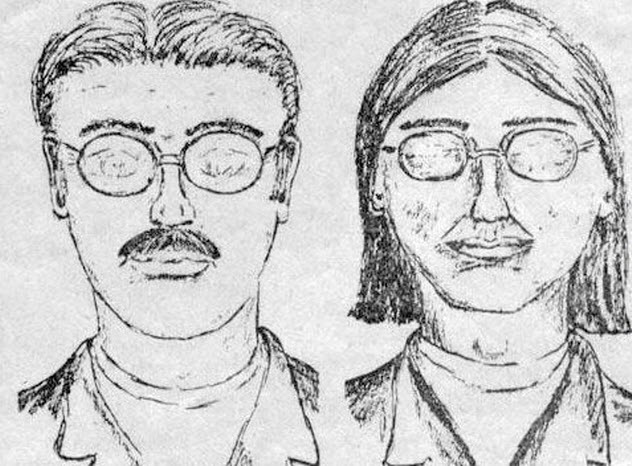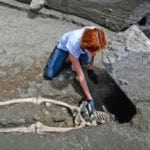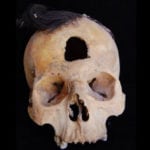Some of California’s unsolved mysteries, like those involving the Black Dahlia and the Zodiac Killer, are known across the country. But plenty of California mysteries—equally bizarre and horrific—have slipped past the rest of the US over the years.
10 The Murder Of James Gilmore Jr.
James Gilmore Jr., nicknamed “Jimmy,” was a tough, 14-year-old boy from Baldwin Park who bullied other children and ran around with a teenage motorcycle gang. His parents were separated, and the family was well-known by the local police. The neighbors considered Jimmy a nuisance, and even his own mother and siblings didn’t particularly like him. While home alone on the night of January 7, 1962, Jimmy and his younger brother, Wayne, heard a knock on the back door while they were watching TV. Jimmy told Wayne that he was going outside and would be back in a little while. When Jimmy hadn’t returned after three days, his mother reported him missing to the police. She told them that her son was “vicious” and had probably run off with some friends. Although Jimmy’s father expressed skepticism about the story, suggesting that his son might not have left the house, authorities never considered the family to be involved in Jimmy’s disappearance. In March 1985, more than a decade after the Gilmores moved out of the house where Jimmy had lived, a worker helping to renovate the home found Jimmy’s skeleton buried beneath the building in a shallow grave. Even though Jimmy’s remains had been lying under the house for more than two decades, neither the Gilmores nor the man who lived in the house after them had ever reported smelling anything. The police gave lie detector tests to Jimmy’s brother and parents, but all three family members passed. As of late 2015, no one has been arrested for Jimmy’s murder, and most of the people connected to the case are no longer alive.
9 The Death Of Michelle Von Emster
On April 15, 1994, the lifeless body of a nude woman was found floating in the water off a beach at San Diego’s Point Loma community. The woman was horrifically mutilated. Her right leg had been torn off, and other pieces of flesh were either missing or covered in bite marks and bruises. Although nobody could locate her clothes or ID, a butterfly tattoo on her shoulder eventually led authorities to identify the Jane Doe as Michelle Von Emster, a 25-year-old drifter who lived in the area. According to Brian Blackbourne, the San Diego medical examiner who conducted the autopsy, Emster was alive when she was savagely attacked. Her neck had been broken, and some of her ribs were cracked, too. Given the severity of her injuries, Blackbourne concluded that Emster was attacked by a great white shark and then died from massive blood loss and drowning. The bite marks on her body, which were too small to have been caused by a great white, probably came from blue sharks after she died. Blackbourne ruled that Emster’s death was nothing more than a tragic accident. Many shark experts, however, dismissed Blackbourne’s conclusion. Contrary to what we see in Jaws, shark attacks are rare, especially in the waters where Emster’s body was found. Blackbourne confessed that he knew nothing about sharks. He consulted a marine biologist, who later acknowledged that there was no direct evidence of a great white being involved. Even if Emster had been attacked by a great white, skeptics point out that it could have occurred after her death. After all, a number of strange details about the case are still unanswered. Why, for example, have her clothes never been found? Her roommate, who had dropped her off at the beach the night before her body was discovered, said that Emster was wearing a green trench coat. The temperature that night was only 15 degrees Celsius (60 °F), so why would she have been swimming naked anyway? And how did she get sand in her lungs? Over the years, a number of theories have been advanced—from suicide to murder—yet Emster’s death still remains a hotly debated mystery.
8 The Disappearance Of Anna Waters
On January 16, 1973, Michaele Benedict was chatting inside with some friends while her four-year-old daughter, Anna Waters, was playing in the backyard of their home in San Mateo County. At about 2:20 PM, after not hearing Anna for quite some time, Michaele realized that her little girl wasn’t in the backyard anymore. After searching her property for about 30 minutes, Michaele called the police. Initially, investigators feared that Anna had fallen into a nearby creek and drowned, but no trace of her was found in or near the water. Although the accusation has never been proven, some investigators and family members believe that Anna’s biological father, George Henry Waters, may have abducted her. Waters was a prestigious doctor who suffered from paranoid schizophrenia. His friendship with a shady psychic named George Brody destroyed his marriage with Anna’s mother. He went off to live with Brody in San Francisco after their divorce. Brody, a mysterious and manipulative con man, insisted that Anna was the reincarnation of a woman he had once known. Strangely, Waters never showed any concern over Brody’s obsession with his daughter. When Brody died in 1981, Waters committed suicide two weeks later. Years after Anna went missing, her half brother, Nonda, remembered an incident that he and Anna had never told their parents about. A month before her disappearance, Anna and Nonda had been playing in front of their home when an unfamiliar man and woman pulled up to them in a Chevrolet Impala. The couple tried persuading Anna to get into their car but left after she refused. Whether this couple had anything to do with Anna’s later disappearance was never established.
7 The Murder Of Georgette Bauerdorf
Shortly before noon on October 12, 1944, 20-year-old Georgette Bauerdorf was found dead in her apartment in West Hollywood. Bauerdorf, an aspiring actress and the daughter of a wealthy oil tycoon, was discovered facedown in the bathtub with a washcloth stuffed into her mouth. At first, police thought that Bauerdorf might have drowned after slipping and becoming unconscious, but the autopsy concluded that she had been beaten, raped, and suffocated. Although all of her valuable jewelry had been left untouched, the killer did steal $100 and a car from Bauerdorf. The car was found 20 kilometers (12 mi) away from her apartment the next day. Police also discovered that a light outside her apartment had been unscrewed and turned off. Her front door was unlocked, which suggested that the killer either had a key or forced his way in after luring Bauerdorf to open the door. Bauerdorf was a hostess at a Hollywood club that entertained servicemen, so police speculated that the killer might have been somebody she knew there. A coworker told them that Bauerdorf had a strange ex-boyfriend whom she had gone out with the previous month. The man was a serviceman who dearly loved Bauerdorf, but she didn’t have the same feelings and broke up with him. The authorities tried in vain to find the man, but he was never located. A year after Bauerdorf’s death, the Los Angeles police received a bizarre note claiming that her killer was a soldier who served in Okinawa. “The murderxx (sic) of Georgette Bauerdorf was Divine Retribution,” it said. “Let the Los Angeles police arrest the murderer if they can.”
6 The Disappearance Of Bryce Laspisa
In the early hours of August 30, 2013, 19-year-old college student Bryce Laspisa was driving home from northern California when he called his parents and told them that he was going to pull over and sleep. Bryce, who had been visiting his girlfriend, never returned home that morning. Around 8:00 AM, an officer from the California Highway Patrol showed up at the Laspisas’ home in Laguna Niguel to tell them that Bryce’s crashed car had been found near Castaic Lake. The car had been discovered lying on its side with its back windshield cracked open. There was no sign of Bryce, although his wallet, phone, and laptop had been left behind. While he might have been able to get out of his car, authorities speculated that he could have suffered a head injury in the crash. Despite numerous searches of the area, both by air and foot, Bryce Laspisa has never been found. Rather than being the unfortunate victim of foul play, Bryce’s parents believe that their son is still alive. A few days before his disappearance, Bryce hadn’t been acting like himself. He had broken up with his girlfriend on August 28, and his parents reported him missing the next day after he failed to give them a promised phone call. After police found Bryce unharmed at a rest stop, he called his family and said that he was fine. As for the crash near Castaic Lake, some people have theorized that Bryce ran away from home. Several unconfirmed sightings have placed him in Washington, Nevada, and Oregon.
5 The Disappearance Of Christine Walters
On November 12, 2008, a couple near the northern California city of Eureka found 23-year-old Christine Walters naked and bleeding on their doorstep. They took the incomprehensible young woman to a hospital, where she refused to explain what had happened to her. After she was discharged, Walters told her mother in Wisconsin that she had been chased by demons through a forest after she participated in a shamanic ritual. Her mother offered to fly to California to get her, but Walters insisted that she would fly back to Wisconsin by herself. According to her mother, Walters acted paranoid on the phone over the next few days. She believed that the forest demons were trying to hunt her down. She couldn’t say why she was bleeding and naked that day because the demons would hear her. On November 14, Walters left her ID and backpack at a coffee shop and walked out. She was never seen again. Walters had been staying on the West Coast for the four months preceding her disappearance. She had fallen in love with northern California’s natural beauty and alternative lifestyle scene. According to friends and family back home, she had met a group of like-minded spiritualists. Walters was a trusting person, and it’s possible that she might have become involved with a dangerous crowd among the alternative community.
4 The Murder Of Stephanie Crowe
On the morning of January 21, 1998, 12-year-old Stephanie Crowe was discovered dead in her bedroom by her grandmother in Escondido. She was found lying in her doorway but had been stabbed in her bed nine times. Police were unable to find fingerprints or DNA at the scene of the murder. They never found the murder weapon, either. Amazingly, none of Stephanie’s family members claimed to have heard or seen anything suspicious during the night. Nothing in her bedroom was in disarray, and her door showed no signs of forced entry. A schizophrenic drifter named Richard Tuite had been seen in the Crowes’ neighborhood the previous night, banging on doors and shouting for a girl he called “Tracy.” However, the authorities let him go due to a lack of evidence. Their investigation then turned to Stephanie’s older brother, Michael. He said that he had walked past Stephanie’s bedroom in the early morning yet hadn’t seen her body in the doorway. Police accused Michael of being jealous of Stephanie, and he eventually confessed to his sister’s murder after a series of brutal and manipulative interrogations. His friends Josh Treadway and Aaron Hauser were also implicated and questioned. Although Josh admitted his role in the murder, Aaron denied having anything to do with it. He offered a detailed hypothesis about how the murder might have been carried out, yet he never gave a confession. The three teenagers were initially charged with murder but never prosecuted because their confessions were forced. Suspicions turned again to Richard Tuite, whose shirt was found to have traces of Stephanie’s blood. Tuite’s lawyer argued that her client’s shirt, which had been taken by the police when they arrested him, had been contaminated due to sloppy handling of crime scene evidence. Although Tuite was convicted for Stephanie’s murder in 2005, he was acquitted after a retrial in 2013 due to lack of evidence.
3 The Keddie Murders
Keddie, a quiet and peaceful resort town of log cabins, was the site of a horrific quadruple homicide in 1981. On the night of April 11, 14-year-old Sheila Sharpe had gone to a neighbor’s house to spend the night. When she came home in the morning, she found that her mother, Sue, her brother Johnny and his friend Dana had all been tied up and stabbed to death. Her younger sister, Tina, was missing, yet her younger brothers, Ricky and Greg, and their friend Justin were unharmed in the brothers’ bedroom. The police were at a loss to uncover a killer or a motive. The murder victims had been relentlessly tortured. Sue and Johnny had been struck with a hammer, and Dana had been strangled. The stabbing had been so violent that the blade of the murder weapon, a steak knife, was bent backward. Incredibly, Ricky and Greg said that they had slept through the attack. But Justin changed his story several times. In one of his accounts, he said that he witnessed the murders and Tina being taken. In other statements, he claimed to have dreamed the incidents he described. In 1984, Tina’s skull was found 50 kilometers (30 mi) away from Keddie. Her cause of death could not be determined, but it seemed that she had died the night of the attack. Meanwhile, the search for the murderer was at a standstill. There were still no suspects, although Justin’s father, Martin Smartt, and his friend Bo Boubede acted strangely when they were interviewed by police. Smartt even described how the murders might have been carried out yet was never pressed further. Years after the murders, his therapist claimed that Smartt once said that he had killed Sue because she encouraged his wife to divorce him. He supposedly killed Tina, too, but denied killing Johnny and Dana. Both Smartt and Boubede are long dead, however, and the case remains officially unsolved.
2 The Unsolved San Diego Murders Of 1931–1934
Between 1931–34, a series of brutal, unsolved murders were committed in San Diego. While the murders were never clearly linked together, police believed there was a connection because all five victims were young females. The first victim, Virginia Brooks, disappeared on her way to school in February 1931. Her body was found in a burlap sack a month later, “virtually hacked to pieces” as one contemporary newspaper reported. The second victim, a 20-year-old woman named Louise Teuber, was found hanging nude from a tree on April 19, 1931. Her coat, dress, and underwear were discovered near her body along with a package that held her bra. At first, police thought that it might have been a suicide, but her left hip, neck, and shoulders also showed bruises. The autopsy later concluded that she had been strangled by the rope and then suspended from it. Less than a week after Teuber’s murder, a woman named Dolly Bibbens was found dead in her apartment. She had also been strangled to death. On May 4, 1931, 27-year-old Hazel Bradshaw was found stabbed to death in Balboa Park. An old sweetheart, Moss Garrison, was charged with her murder, but he was acquitted. For the next three years, the murderer is believed to have been quiet until he struck again on August 17, 1934. His fifth and final victim, 16-year-old Celia Cota, had left her house around 8:00 PM to go for a walk. Her parents reported her missing around midnight, and her body was found by police in the family’s backyard in the morning. Granted, Cota might not have been the San Diego killer’s last victim, but there’s also the possibility that the murders were never connected.
1 The Death Of Gary DeVore
Gary DeVore, the screenwriter behind the Hollywood movies Raw Deal and Time Cop, was working on a remake of the 1949 movie The Big Steal before he disappeared on June 28, 1997. After visiting a friend in New Mexico for a week, DeVore left to go home to Santa Barbara, California, on June 27. Around 12:38 AM, DeVore called his wife, Wendy, on his cell phone, but she said she’d call back after a TV show she was watching ended at 1:00 AM. When the show was over, Wendy called her husband three times, yet he didn’t pick up. At 1:15 AM, DeVore called her back, saying he would be home in the next couple of hours. That was the last time anybody ever heard from him. A year after DeVore’s disappearance, a lawyer and armchair detective named Douglas Crawford read about the case in a newspaper and suddenly remembered a story about a woman who had driven into the California Aqueduct. Crawford suspected that the same thing might have happened to DeVore. In early July, Crawford retraced DeVore’s route and found car debris on the aqueduct’s embankment. He contacted the police, and a search of the water uncovered DeVore’s car, where his body was found in the front seat. A number of different theories have been proposed for how DeVore ended up in the aqueduct. Some suggested that he committed suicide, while others thought he had driven into it accidentally. His wife believes that he was abducted and murdered. During his last phone call to her, DeVore had not acted like his usual self. Wendy suspects that somebody was with him. A conspiracy theory, which was the subject of the 2014 documentary The Writer with No Hands, claims that he was murdered by the CIA. According to this theory, DeVore had been involved with the CIA and was assassinated after he planned to incorporate some dark secrets about the 1989 US invasion of Panama into his new script. Tristan Shaw runs a blog, Bizarre and Grotesque, where he writes about unsolved mysteries, paranormal phenomena, and other creepy things.
























